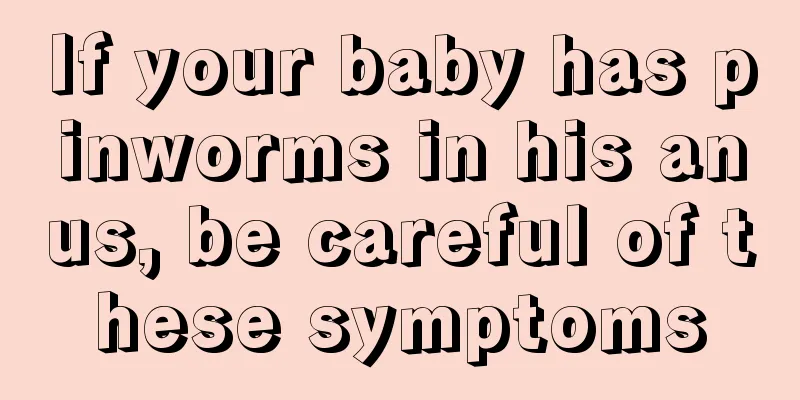If your baby has pinworms in his anus, be careful of these symptoms

|
In daily life, about 1/3 of patients will be infected with worms. The symptoms of worms are very obvious and will appear around the anus. Many children often scratch or rub their anus. This symptom should be considered as worms in the anus or worms in the stool causing anal infection. As parents, you need to clean your children in time. If necessary, you can take some anti-worm medicine to alleviate this problem. Symptoms and signs About one-third of people infected with pinworms have no symptoms at all. Typical symptoms include unbearable itching of the anus or genitals at night, which may cause perianal erosion, eczema-like rash, bleeding and secondary bacterial infection, and local swelling and pain. Sometimes symptoms such as nausea, vomiting, abdominal pain, diarrhea, and rectal prolapse may occur. Some children may have neuropsychiatric symptoms such as lack of appetite, weight loss, nail biting, irritability, insomnia, teeth grinding, enuresis, and night terrors. Pinworms parasitizing the appendix can cause inflammation, bleeding, necrosis or clinical symptoms similar to appendicitis. Female worms parasitize ectopically in the vagina, fallopian tubes, abdominal cavity, etc., which can cause inflammation in these areas and form granulomas. It can also cause prostatitis, ischiorectal abscess, urethritis, subcutaneous nodules, etc. Occasionally, eosinophilic granulomas of the lungs may occur due to inhalation of dust containing worm eggs. Diet and health care The diet should be light, pay attention to hygiene, and have a reasonable diet. Preventive Care 1. Strengthen publicity and education, strictly implement personal hygiene system, cut nails short, wash hands before eating and after defecation, take a bath frequently, change underwear frequently, and correct the habit of sucking fingers. 2. Pay attention to environmental hygiene and treat patients. Nurseries and kindergartens where this disease is prevalent should conduct widespread screening and treatment, and underwear should be steamed and boiled to kill eggs. Pathological etiology Pinworm (Enterobius vermicularis) parasitizes the lower small intestine and colon. It is a small nematode. The female worm is about 1 cm long, milky white, slightly thicker in the middle of the body, and has a slender tail that looks like a white line segment. The male's body length is about 1/3 of that of the female, and its tail tip is curled toward the ventral side. The head drills into the mucous membrane to absorb nutrients, devour intestinal contents, and sometimes suck blood. The female worm usually leaves the intestinal wall and crawls towards the anus to the perianal area and perineum at night to lay a large number of eggs. This may be related to air stimulation. After the female worm lays eggs, it can return to the rectum and descend again to lay eggs after a period of time; but most female worms die outside the anus due to the desiccation and rupture of the worm body; the lifespan can be as short as 2 months and as long as 8 months or more. The eggs are 50 to 60 μm long, 20 to 3 μm wide, colorless and transparent, flat on one side and slightly raised on the other. The eggs develop rapidly in the air and become infectious eggs within 6 hours. After being swallowed, they hatch in the stomach and duodenum. The larvae continue to migrate downwards, molt three times, and mature in the lower small intestine, cecum, appendix, etc. The male and female mate in the upper colon and cecum. The male dies shortly after mating, and the female migrates to the anus to lay eggs. The life cycle takes about 2 weeks to 1 month. In some cases, the number of infected parasites can reach 3,000 to 10,000. Fold to edit this section Disease diagnosis Pinworms cause itching of the perineal skin, which is similar to the symptoms caused by perineal fungal infection, allergies and eczema. The clinical manifestations of pinworm urinary tract inflammation are similar to those of general urinary tract infection, and both should be distinguished. Considering the age, onset characteristics and local signs, clinical diagnosis is usually not difficult. The presence of pinworms or eggs in the perianal area is direct evidence for differential diagnosis. |
<<: Baby's heart fire is heavy. With these recipes, these symptoms can be improved
>>: What medicines are effective in reducing phlegm in children?
Recommend
What are the types of cerebral palsy in children?
Children are loved by adults because of their inn...
What to do if children cough with yellow phlegm
In our daily life, we often see children coughing...
Two and a half year old baby is short
If a two-and-a-half-year-old baby is short, paren...
Why can't my three-month-old baby smile?
Although it is not a big problem if a 3-month-old...
What can children eat to have smart brains?
Parents all hope that their children can be smart...
Geographic tongue treatment, Chinese medicine is effective
Geographic tongue often occurs in children and ad...
What causes chapped lips in children?
The wind is strong in autumn and the weather is d...
Classification of children's coughing while sleeping
In fact, if your baby coughs while sleeping in da...
Common psychological problems and counseling for high school students
High school is the golden period in people's ...
What should children eat to get better quickly if they have dampness?
Excessive moisture has a great impact on the body...
At what age is it best for children to take anthelmintics?
For someone like me who was born in the 1980s, wh...
What are the manifestations of precocious puberty in boys?
I believe everyone knows what precocious puberty ...
How to wash dirt off a baby's head
After the baby is born, some substances will rema...
Causes of aplastic anemia in children
Children's physical health is what the family...
Symptoms of calcium deficiency in 9-month-old babies
9-month-old babies are in the toddler stage, and ...









